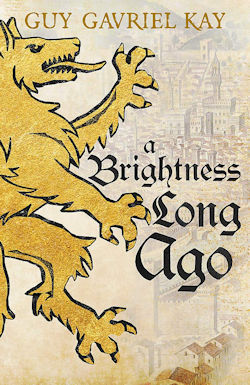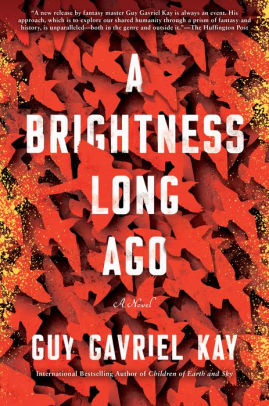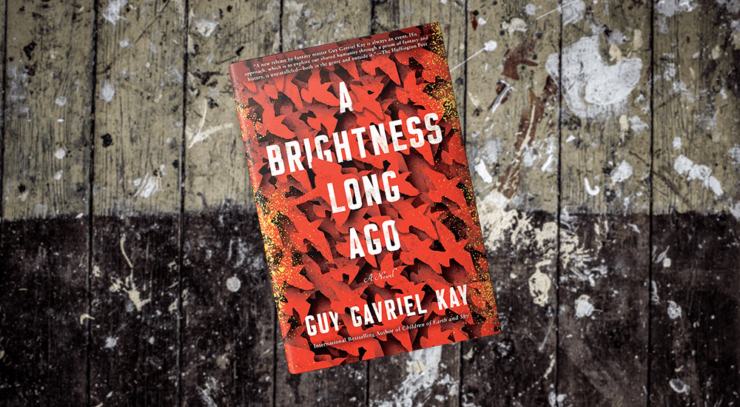We all know how the story of the chosen one goes. We all know of fellowships formed around unlikely heroes who come from nothing but become something like legends when they declare against the darkness. We all know that the fate of the land, or the larger world, or perhaps the entire galaxy, hangs in the balance in this tradition of fiction. A Brightness Long Ago isn’t about any of that. Instead, it’s interested in what we don’t know—in the little things that happen to the little people, in particular.
That might sound slight, but remember: everything is relative. To those little people, those little things have huge meaning. Their lives and their loves and their losses matter as much to them as any magical ring or other missing MacGuffin, Guy Gavriel Kay goes out of his way to say. They also play a part in the weaving of the world that will be, and the otherwise incidental conflicts that they’re caught up in do more than set the scene for the larger clashes to come; to their participants, they are of profound importance, of course.
A Brightness Long Ago is not by any stretch of the imagination an argument against epic fantasy, for it is both vast and fantastical in passing, but like Children of Earth and Sky before it, it is powerful proof, as exquisitely articulated as anything this thoughtful author has put to the page, that there are “so many stories that can be told, in and around and braided through the one we are being given. Don’t we all know that stories can be sparks leaping from the bonfire of an offered tale to become their own fire, if they land on the right ground, if kindling is there and a light breeze but not a hard wind?”
Imagine what fantastic fiction could look like if its designers deliberately directed our attention away from the centre of the stage. There, where there is less light, and the shadows are correspondingly softer, “richness and sorrow can be entangled.” There’s no pure good in this place, and no absolute evil. Indeed, in what can be interpreted as a declaration of intent, what simple wickedness there is in A Brightness Long Ago is dispatched fast—done away with within half a chapter, in fact.
 “There were and there are bad men ruling some of the larger and smaller city-states of Batiara,” which is to say Kay’s quarter-turned take on Renaissance-era Italy, rendered as vividly and vibrantly here as it was in Sailing to Sarantium, “but I don’t think many would dispute that Uberto of Mylasia was among the very worst in those days.” Known nearby as the Beast in large part for his predilection for summoning children to his chambers before sending them home terribly hurt, if they’re sent home at all, Uberto receives, on the fateful evening A Brightness Long Ago begins, a visitor unlike any other he’s received previously.
“There were and there are bad men ruling some of the larger and smaller city-states of Batiara,” which is to say Kay’s quarter-turned take on Renaissance-era Italy, rendered as vividly and vibrantly here as it was in Sailing to Sarantium, “but I don’t think many would dispute that Uberto of Mylasia was among the very worst in those days.” Known nearby as the Beast in large part for his predilection for summoning children to his chambers before sending them home terribly hurt, if they’re sent home at all, Uberto receives, on the fateful evening A Brightness Long Ago begins, a visitor unlike any other he’s received previously.
“She was older than the very young girls Uberto preferred, and probably too tall, but she was a handsome woman, and there weren’t many of those left in or around Mylasia,” for reasons we needn’t repeat. Though she uses another name on this day, she is Adria Ripoli, the forceful daughter of one of the region’s wealthiest families, and she has come, by choice, to ensure that the Beast never again abuses the people he has power over. To that end, she kisses him goodbye with lips glossed in poison, then slips out of his terrible tower by way of a secret staircase—but not before taking a knife in the thigh.
Adria would almost certainly have bled to death before making good her escape were it not for one Guidanio Cerra, the only son of a Seressan tailor sent to school by a father whose friends knew the right people and then to serve Uberto by a tutor who knew the opportunities such a perilous position would provide. Despite this, all he really wants is to return home to be a bookseller, but knowing the nature of the Beast, Guidanio decides that he would rather be complicit in his assassination than in the capture of his assassin. To wit, he assists a wounded Adria in her flight that night, never expecting to see her again, however dearly he wishes he would.
Some months later, his wish comes true—though he might well wish it hadn’t—after “an encounter on a springtime road” that speaks to a favourite fascination of Kay’s, namely “the random spinning of fortune’s wheel [and the ways] it can sway us, change us, shape or end our days.” Having left his life in Mylasia behind, Guidanio is spun in just such a chance fashion when he ends up in the company of Teobaldo Monticola, the lord of Remigio and a famed mercenary leader. Monticola also happens to be the sworn enemy of Folco d’Acorsi, Batiara’s other great captain, and the man whose orders Adria was enacting when she eliminated Uberto. So it is that Guidanio is caught up in a conflict that has been long in the coming—a conflict that could cost him everything, not least his life.
For what it’s worth, Folco is “also a lord, his family having ruled for three generations now in Acorsi,” but it turns out that his title, like Monticola’s, is more of a token than a trophy. “The great mercenaries earned money with their armies to sustain power in their small cities. They might be lords in name but […] the truth was, these two men, however famed and fierce, did whatever they did at the sufferance of greater powers.” That said, “these were not men one would want to choose between, to say that one was serving good in the world and the other not,” so the position Guidanio and Adria find themselves in, as the rivalry between their warring lordlings escalates, is an unenviable one, especially as they “live, it might be said, in unstable times. Dramatic, interesting, magnificent in many ways. But not stable. You would never say that.”
Buy the Book


A Brightness Long Ago
The push and pull at the heart of A Brightness Long Ago’s narrative also informs its structure, which brilliantly resists the tendency of such tales to pick a side and stick with it. No one of the novel’s seventeen lengthy chapters tells a single story from a single perspective, you see. Although most are arranged around a single event, we’ll see it from both sides to begin with, neither one of which is entirely in the right or entirely in the wrong. Monticola and his men might do deplorable things from time to time, but so too do Folco and his fighters, meanwhile the mercenary captains are equally capable of kindness, consideration and whimsy.
In addition to showcasing such scenarios from the trenches, as it were, Kay also contrives to evidence the echoes of certain events as felt by a range of characters external to their occurrence—most notably the wandering healer, Jelena, and Antenami Sardi, fool of Firenta—so that everything that happens happens to everyone, be they inside or outside the scene, as opposed to only those who are directly affected. This patchwork of perspectives lends such power and presence to the relatively trivial affairs that A Brightness Long Ago is about that they start to matter. Factor in the figures you’d expect to find on the fringes of such fiction, drawn here with such depth and tenderness and intelligence by a craftsman as much a master of his medium as the expert painters and mosaic-makers Kay frequently favours as his narrators are of theirs, and what we’re left with is, in short, a novel that gives the insignificant significance.
Guy Gavriel Kay has told his epic fantasy tales, in his time, and touched on most, if not all of those tropes we talked of at the top, but in A Brightness Long Ago, he turns his attention to the kinds of characters and conflicts you tend to find sidelined in such stories, to truly tremendous effect. This is an account of “things done in the world, affecting the world, but kept close, secret, private,” and I can’t imagine anyone in a better position to give it than the author I believe to be the finest in his field.
A Brightness Long Ago is available from Berkeley Press in the US, from Hodder & Stoughton in the UK, and from Viking in Canada.
Niall Alexander is the manager of an extra-curricular education centre, and also, increasingly occasionally, a reader and a writer. He lives with about a bazillion books, his better half and a certain sleekit wee beastie in the central belt of bonnie Scotland.










